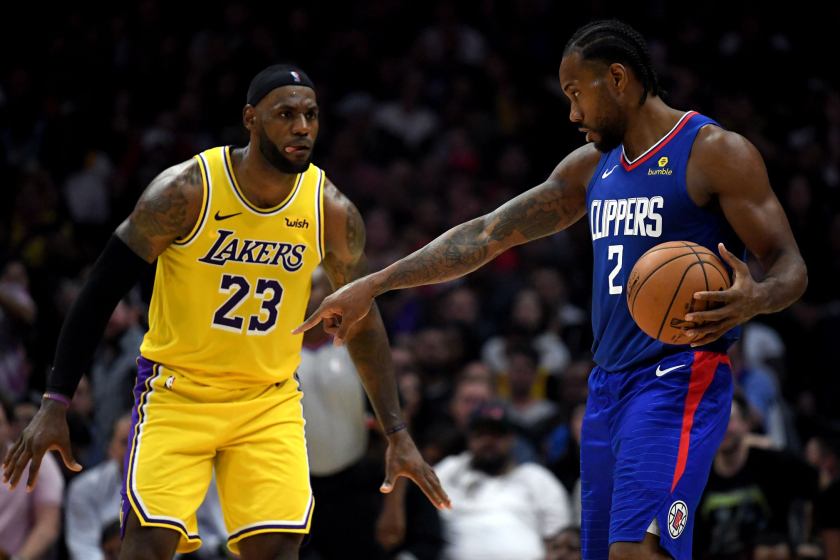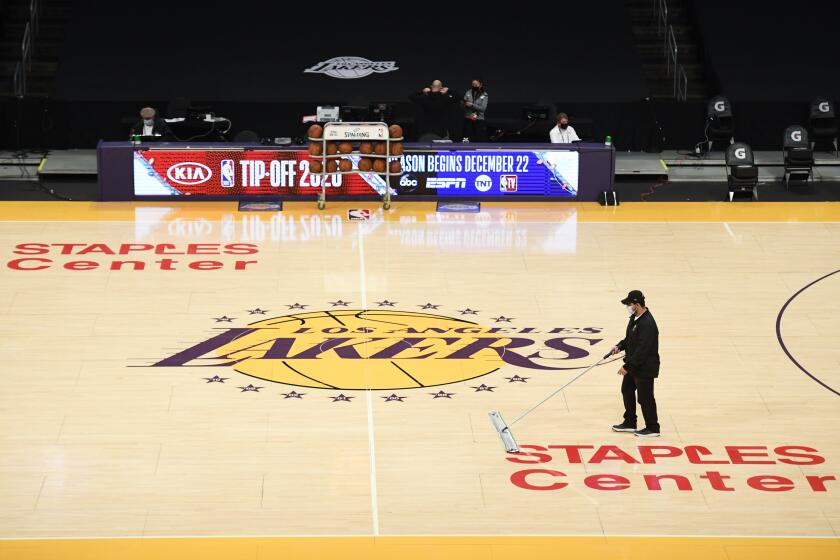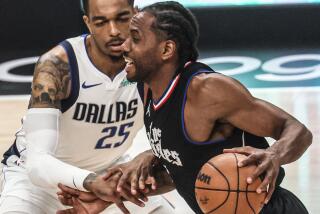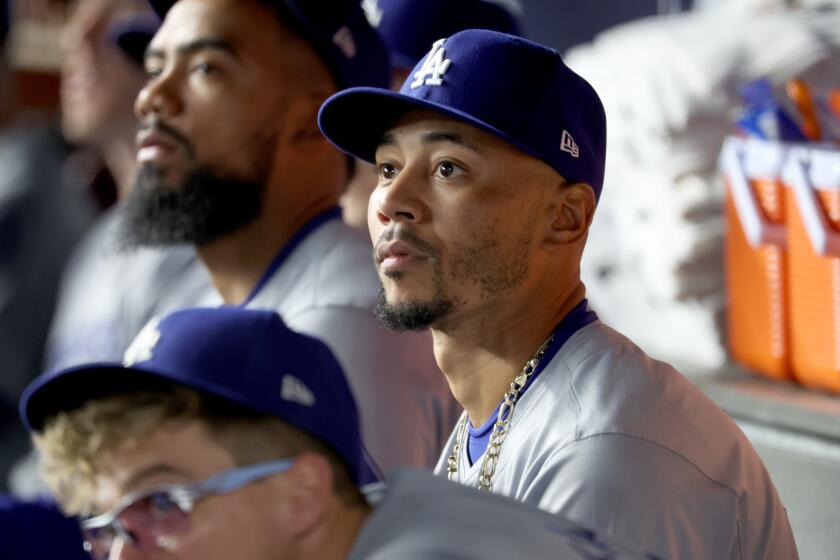Load management: No secret here, it’s the NBA way to survive
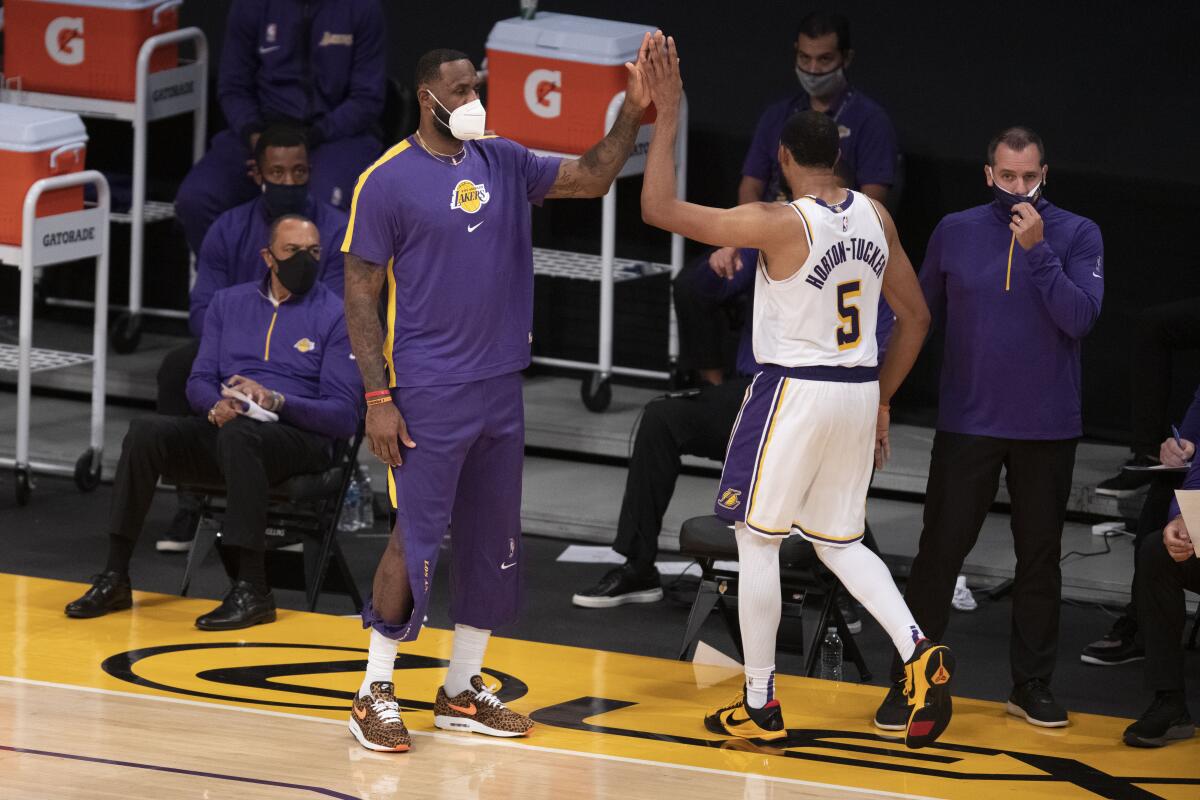
During the first basketball game at Staples Center in nine months, LeBron James flowed with energy, bouncing around the court and reveling in the success of his teammates during the first game as defending NBA champions.
He wasn’t playing, though, instead banished to the sideline because the Lakers were taking a cautious approach with their veteran star’s preseason workload. He still chased down loose balls that night, but he did it with a KN95 mask covering his nose and mouth, warmups covering his body and running shoes on his feet.
It’s something that could happen again when the games count, as the Lakers try to repeat as champions with only 71 days between their title victory and the start of their title defense.
“Obviously, every game matters, but we’re competing for something that’s [bigger]. We don’t ever want to shortchange our stuff,” James said before the season. “For me personally, that’s a fine line with me, but understanding that it’s a shortened season. … The offseason is going to be the shortest season for any professional sport ever. We’re very conscientious about what we’re going to do going forward as far as me personally.”
Load management isn’t a Kawhi Leonard thing anymore in Los Angeles — it’s not just a Los Angeles thing. Medical experts and coaches around the league, unsure of the effects of an unconventional offseason, are expecting teams to be as cautious as ever with their most valuable players.
“COVID is the most obvious concern both for the players’ health and for the integrity of the game but one of the things that is also in the back of my mind is has there been enough time for the players to rest and recover? Especially those teams who were in the playoffs and went deep in the playoffs,” Dr. T.O. Souryal, who spent more than two decades as the Dallas Mavericks’ team doctor, said. “... I am a bit concerned about how they’re going to manage that. The good news is it is a 72-game season, which is shorter. The bad news is it’s somewhat condensed.
From the expected load management to the unknown of a pandemic-stricken season with no bubble protection, the 2020-21 NBA season will offer unique challenges.
“Yeah, I’m a little worried about the health and safety as we get closer to the end.”
The end, in this case, is the NBA Finals. It’s the destination the Lakers, the Clippers and a handful of other teams believe they’re headed.
“We’re a marathon team. We understand that,” James said after the Lakers’ preseason finale in Phoenix. “We’re not in a sprint.”
It’s an interesting sentiment from James, a player who has the awe of his peers because of his longevity. But he’s also freshly removed from a season during which he and co-star Anthony Davis played through minor injuries with a nightly urgency that mostly went unmatched during the regular season.
People around the NBA wondered if James was trying to prove a point about his standing in the league, in particular when it came to Leonard’s arrival in Los Angeles. With long-term memory a forgotten asset, Leonard had some wondering if he was the league’s top player following his championship with Toronto.
Leonard’s ascension coincided with James missing the playoffs in his first year with the Lakers. James undoubtedly played with a chip on his shoulder during his second season in Los Angeles, mockingly anointing himself the “Washed King” while pushing the Lakers to 24 wins in their first 27 games.
It was a reminder as to the kind of impact James could have while physically pushing himself on both ends of the court as the Lakers dominated the 2019-20 NBA season.
“There is nobody in the NBA who takes care of their body and is more in-tuned to their body than LeBron James. He spends the most money. He’s also in the best shape,” Philadelphia 76ers coach Doc Rivers said. “Like, LeBron has understood one thing and this is as good as you are, you need your body. And your mind.
“Forget just his greatness, I think what he’s really showing a lot of young players — hopefully they are noticing — LeBron is always in tip-top shape, physically and mentally, and that is just as important as anything else.”
Load management can mean more than sitting out games. It can mean fewer practices, shorter minutes and/or lightened workouts. It’s not revolutionary, though Leonard certainly popularized it in his lone season in Toronto.
“Load management is a relatively new term. This is something that five years ago it was done but it wasn’t called that. Now it’s in our regular vocabulary,” Souryal said. “And I do think this particular season, that’s going to have major impact. How are you going to manage the load on your big-minute players in a condensed season? I don’t know.
“It’s going to be challenging.”
You can expect postponements when the new NBA season begins Tuesday, but health and safety protocols could limit disruptions and allow a season to be completed.
Sitting out some players while asking others to grind through the 72-game season can create problems inside locker rooms with preferential treatment one of the tried-and-true disruptors of chemistry. It was, in some ways, at the root of the issues that cost the Clippers last season.
Leonard’s situation, the Clippers said last season, wasn’t about rest so much as it was a medical necessity that got approval from the NBA’s doctors because of a chronic knee issue.
But with a compressed schedule and the disrupted rhythm of a typical NBA offseason, rest will likely be more rampant.
Lakers coach Frank Vogel said his plans for James to rest are “definitely fluid.”
“There will be conversations between the coaching staff, the front office, the medical team and LeBron,” Vogel said. “Just sort of on a day-to-day basis, see how he’s feeling and we’ll see how that plays out.”
With the preseason wrapped and the Lakers ready to open the season Tuesday against the Clippers, James said he thinks there’s a way the team can be smart and think long-term without sacrificing the day-to-day identity that made them such a handful every game last season.
“It’s two different things,” James said. “Obviously, you live in the moment. But you also understand it is a marathon. It’s not a sprint. We’re a veteran ballclub, we understand that, I’ve been a part of some veteran ballclubs. You live in the moment. You make the most of today … but we also know that this is going to be a long journey. And that’s what the marathon is all about.
More to Read
Go beyond the scoreboard
Get the latest on L.A.'s teams in the daily Sports Report newsletter.
You may occasionally receive promotional content from the Los Angeles Times.

